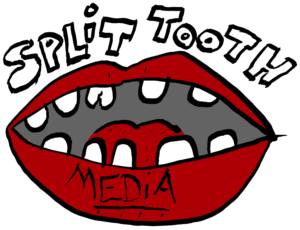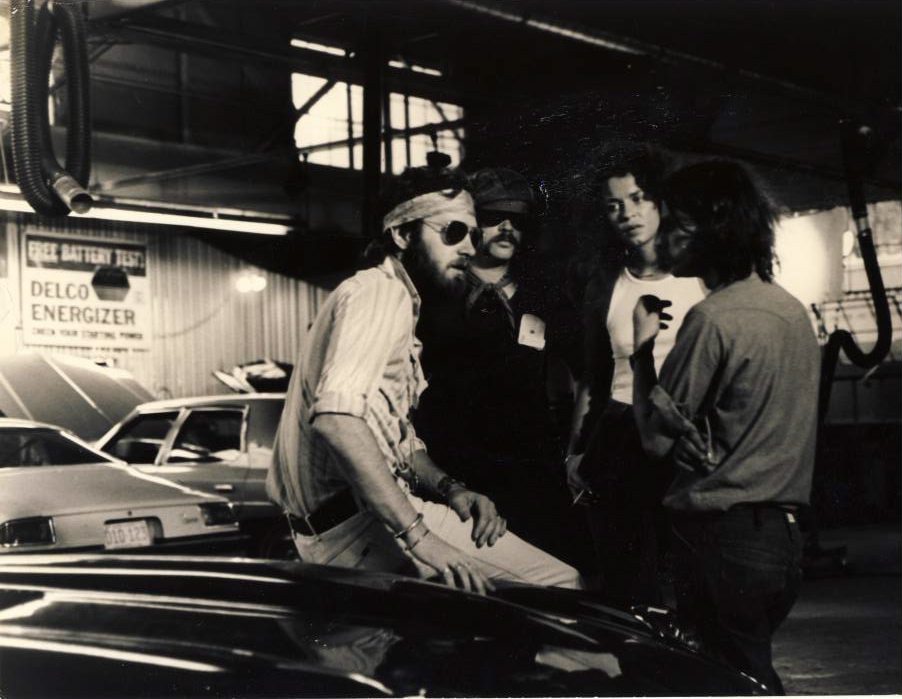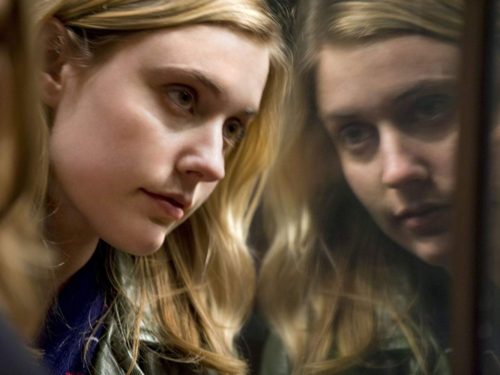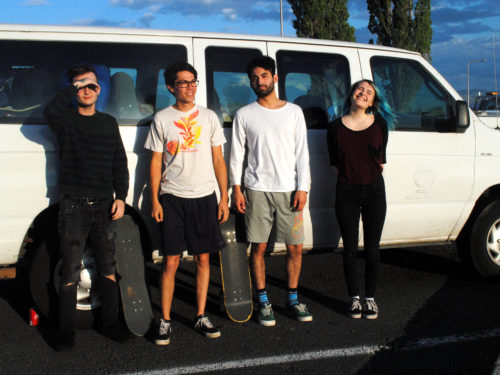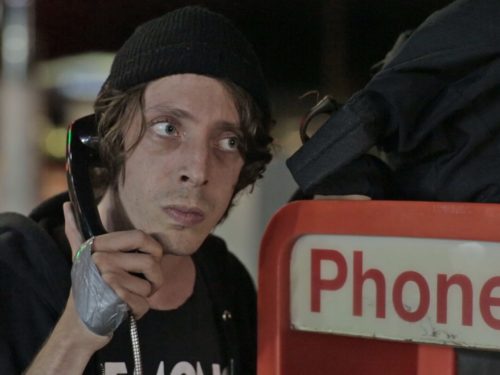Morris and Wozniak look back on their debut feature, 1975’s Loose Ends, and the long filmmaking careers it helped launch
Most people who find their way to Loose Ends (1975) these days do so through its 1988 sequel, Patti Rocks. Neither film has been particularly easy to track down over the past few decades, but Patti Rocks — a road film about two men driving through the dead of a Minnesota winter to talk a pregnant lover into having an abortion — certainly made a name for itself when the MPAA branded the film with an “X” rating for its language. It has since suffered from being remembered more for its marketing campaign as a raunchy comedy than for the incisive and sensitive drama that develops in the final act.
But Loose Ends is a much more reserved and understated film. Made over a decade before Patti Rocks, it was the first feature film from director David Burton Morris and writer Victoria Wozniak. Like many of the great American independent films of its era, such as Charles Burnett’s Killer of Sheep (1978) and Eagle Pennell’s The Whole Shootin’ Match (1978), Morris and Wozniak went against the trends of popular American cinema by focusing on unromanticized working class characters. Loose Ends follows the same men from Patti Rocks, Billy and Eddie (Chris Mulkey and John Jenkins), through mostly average days in the Twin Cities. Eddie has a small family that he struggles to relate to; Billy is recently divorced. They both work as mechanics at the same garage, but they spend most of their time together getting drunk and shooting pool. At one point they take to the road to make an escape from the grind and all their problems. But throughout their journey, very little changes beyond the location. Loose Ends captures the restlessness and the frustration of feeling stuck, yet ultimately, and somewhat tragically, reliant upon doing the same old thing everyday in a way that few films have.
Shot in Minnesota while Morris was on summer break from film school at UCLA, Loose Ends was the beginning of a long and varied career for the two filmmakers. A truly scrappy production, guided by little more than the sheer determination to make a movie, Loose Ends was met with immediate acclaim during its international festival run, leading Morris and Wozniak to Sundance appearances (1982’s Purple Haze), steady work writing and directing films for television, and even a somewhat notorious cult horror movie that Morris made under the name “Derek Savage.”
Loose Ends recently received a beautiful restoration and was nearly set for a Blu-ray release. Unfortunately, plans changed and the film remains a (mostly) hidden gem of 1970s independent American cinema. The following career-spanning interview details Morris’ and Wozniak’s lives behind the camera and all the ups, downs, triumphs, and struggles that come with earning a living from filmmaking in America. Morris hopes to begin shooting his next film, Full Cleveland, in the Fall. Fittingly, it’s a road movie.
Split Tooth Media: Is it true you two met when Victoria was hitchhiking?
Victoria Wozniak: We were both going to the University of Minnesota, and it was back in the day when you were actually fairly safe hitchhiking because the only people, if you were a hippy, who would pick you up were people of the same mind. I was hitchhiking back from the U, and David pulled over and picked me up.
David Burton Morris: But you said once that I passed you a day or two before that.
Wozniak: Yes, you passed me earlier but you couldn’t pull over. It was another day or so later that he drove by again and picked me up. So I consider it that he was looking for me. He had all this film equipment in the back of his car and I thought he was some bourgeois hippy.
Morris: I had cowboy boots and my jeans were pressed.
Wozniak: I was a little more radical and political at the time.
Morris: As we got closer, I asked where she lived and she said Woodlawn and Stonebridge, which was three blocks from my parents’ house. So we grew up three blocks from each other in St. Paul.
Wozniak: Well, kinda, except my family had moved in much later. But anyway, he took me home and I asked him if he wanted to get high. I lived a half block from the River Road and we went for a walk. I had this grass from these friends of mine who were Vietnam veterans. It was really strong — It wasn’t like that sort of happy Mexican weed that everybody smoked. I didn’t tell him that though. So I took like one or two hits and I let him smoke the rest. So we said goodbye at the door, and then about an hour or an hour and a half later, he showed up again at the front door and said, ‘What the fuck did you do to me? I can’t do anything! ’ He had gone back to the darkroom and couldn’t work. (laughs) So, that’s actually how our relationship started.
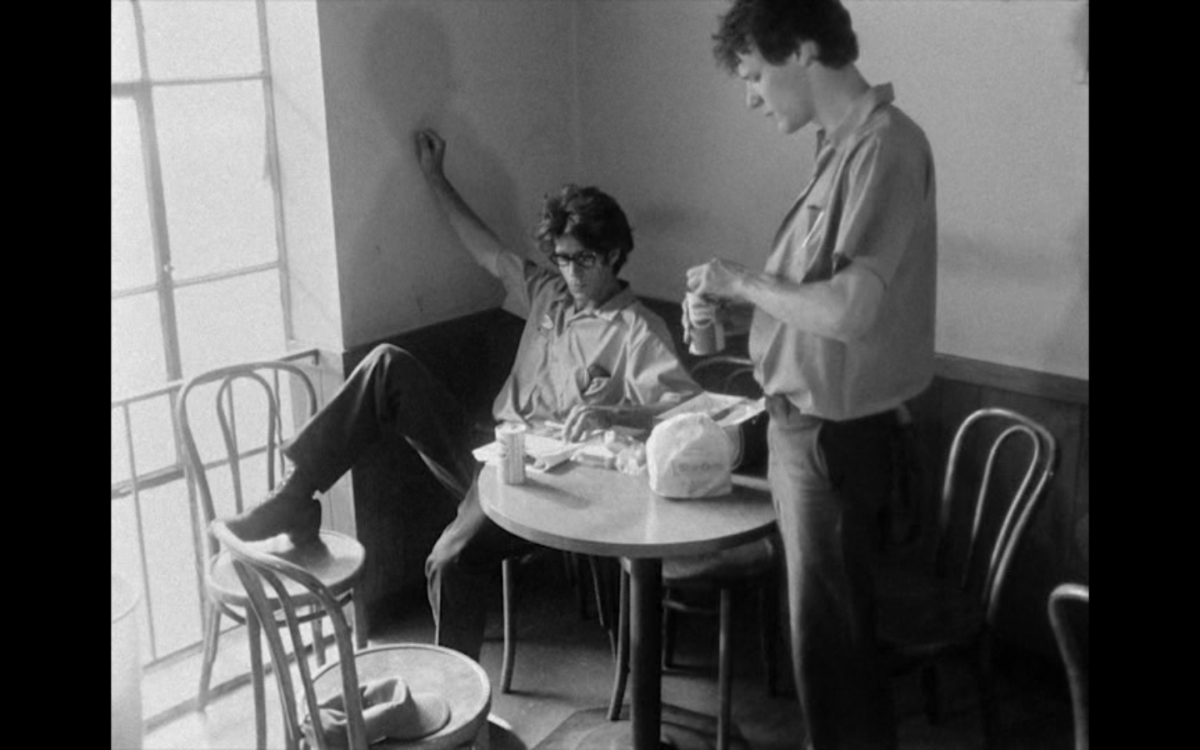
When did you start working together creatively and when did filmmaking become a part of your lives?
Wozniak: David was into [filmmaking] when I met him. He was a still photographer, but he was doing short films as well. When he was making his first short film, he needed a heartbeat sound, and I had some friends who worked at the local public radio. So I went over to their library and got the sound and I dropped it off to him. So we stayed friends.
We were all very political at the time and our university went on strike.
Morris: In 1970.
Wozniak: We kept control of the school for about a week. The Byrds flew in and gave us a free concert. It was all very high and great. And we started making short films almost every day, trying to grab footage and put it together, and show it to people. That’s when we started trying to make stuff together.
Morris: I’d been interested in film since I was 13. I started making little films then, with my neighbor, Steven Greenberg, who went on to fame for writing “Funkytown.” He paid for all the stock and I would shoot it and write little plays. But I didn’t think young people made movies. I had only seen films by Hitchcock and John Ford. It wasn’t until I saw Performance (1970) that I realized young kids could make movies because Mick Jagger was in it, it had great music, and had this radical cutting that I had never seen before.
Where did you meet Chris Mulkey and John Jenkins and how did you come to work with them on Loose Ends?
Morris: I knew Chris from high school. He and John were actors at the Children’s Theatre in Minneapolis. They turned a play of theirs into a feature film and they didn’t know anything about how to do it, so they hired me to sort of put it together. It was called A Suitcase.
Where did the inspiration come from for these characters?
Morris: We decided that the way people were breaking into filmmaking was through horror movies.
Wozniak: We tried to write Attack of the Sewer People. We had this idea where people were flushing fetuses down the toilet and there was a colony of things that grew up in the sewers. It was just an awful idea. I’m not good at writing that stuff, but that’s how we thought you broke in, by making a cheap Roger Corman-like horror film.
Morris: Then I saw Memories of Underdevelopment (1968) at the Walker Arts Center. I came home and said, “Why don’t we do something like that, with blue collar workers in America?”
Wozniak: And it wasn’t something that I knew I was doing at the time — and maybe I’m thinking of this because of the state of our country at the moment — but we all grew up thinking you can do whatever you want if you work hard enough at it. You can be anything you want or do anything you want, because that’s the country we live in. But I had quit college and I had to get a job. I was working at the telephone company as a long-distance operator with all of these women that were lifers. I mean, these lovely women had been there for a zillion years and it terrified me. This was not who I wanted to be; this isn’t the life that I wanted in any way, shape, or form. And I think that’s reflected in Loose Ends: that feeling of being stuck and having to go to a job that you don’t really want to do, but you have to, because it’s a paycheck. That sort of desperate feeling.
Morris: When we screened it in Europe, in Edinburgh for a film festival, I guess nobody was making films about working people in America and that’s why it was so sort-of acclaimed there.
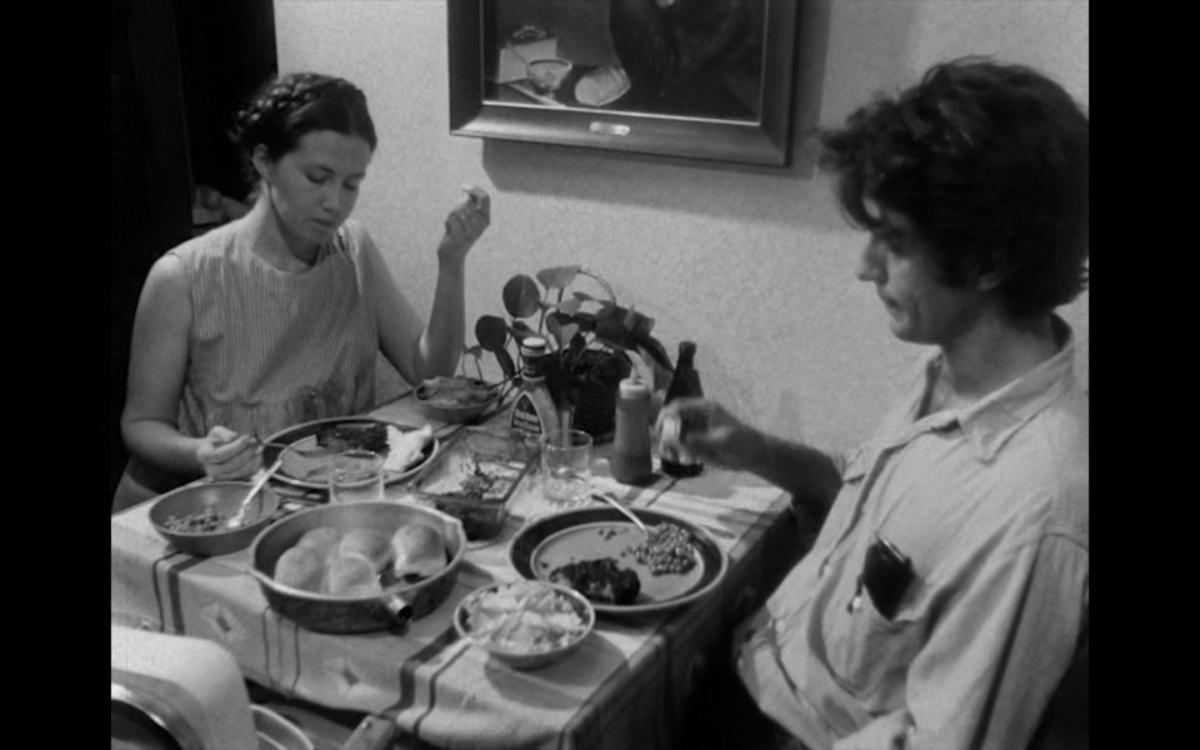
Victoria, Loose Ends was your first screenplay. How did you approach the writing, and did you have any prior writing experience?
Wozniak: No, I was a fine artist, basically. Truly, it was, ‘well, it can’t be that hard.’ We didn’t know any writers and we wanted to do this, so I sat down at the kitchen table and just started writing. So that was really it. I would love to give you some great insight into it, but I really don’t have any. I just sat down and did it.
I made the characters mechanics because I knew the people who owned Midway Chevrolet. I thought I could probably talk them into letting us film there. With a lot of the other locations, too, it was because we knew we could get permission to shoot there. Also, nobody had ever asked before, because no one had ever shot a movie in this town.
Morris: I think Loose Ends was the first feature film ever shot in the state of Minnesota.
Wozniak: The man who owned Midway Chevrolet, which was a huge dealership on University Avenue, gave us permission, but literally everybody that worked for him stopped working to watch us shoot. This went on for days. Nobody worked. He was just like, ‘Oh my god, what did I say yes to?’ (laughs) But it all worked out.
What kind of pre-production work was done for the film? Were you able to do many rehearsals or much casting?
Morris: A lot of people that were in it, we knew. Like that big guy in the diner scene, he was part of the Children’s Theatre. The waitress there was a friend of my wife’s. The real estate salesman was a weatherman on TV. We didn’t need many people. The old guy who ran the garage in the film was Mulkey’s father. The guys shooting pool were all friends of mine. One was Scott Griffis, he was my best friend.
Wozniak: John Jenkins’ wife plays his wife. They were both actors. And that big dog that Eddie brings home for his son (played by Jenkins’ actual son) belonged to a friend. I wrote a lot of things because I knew we could get them.
Morris: There was very little pre-production. We scheduled it out, and it was like 14 days, and we did OK. It was beg and borrow. I had a college fund that my grandparents set up for me, and I spent all that money.
Wozniak: We were really a “you get the costumes, I’ll get the barn” production. (laughs) It’s really true. At one point we needed some money so we went to a friend who worked in a bank who gave us an unsecured loan. (laughs)
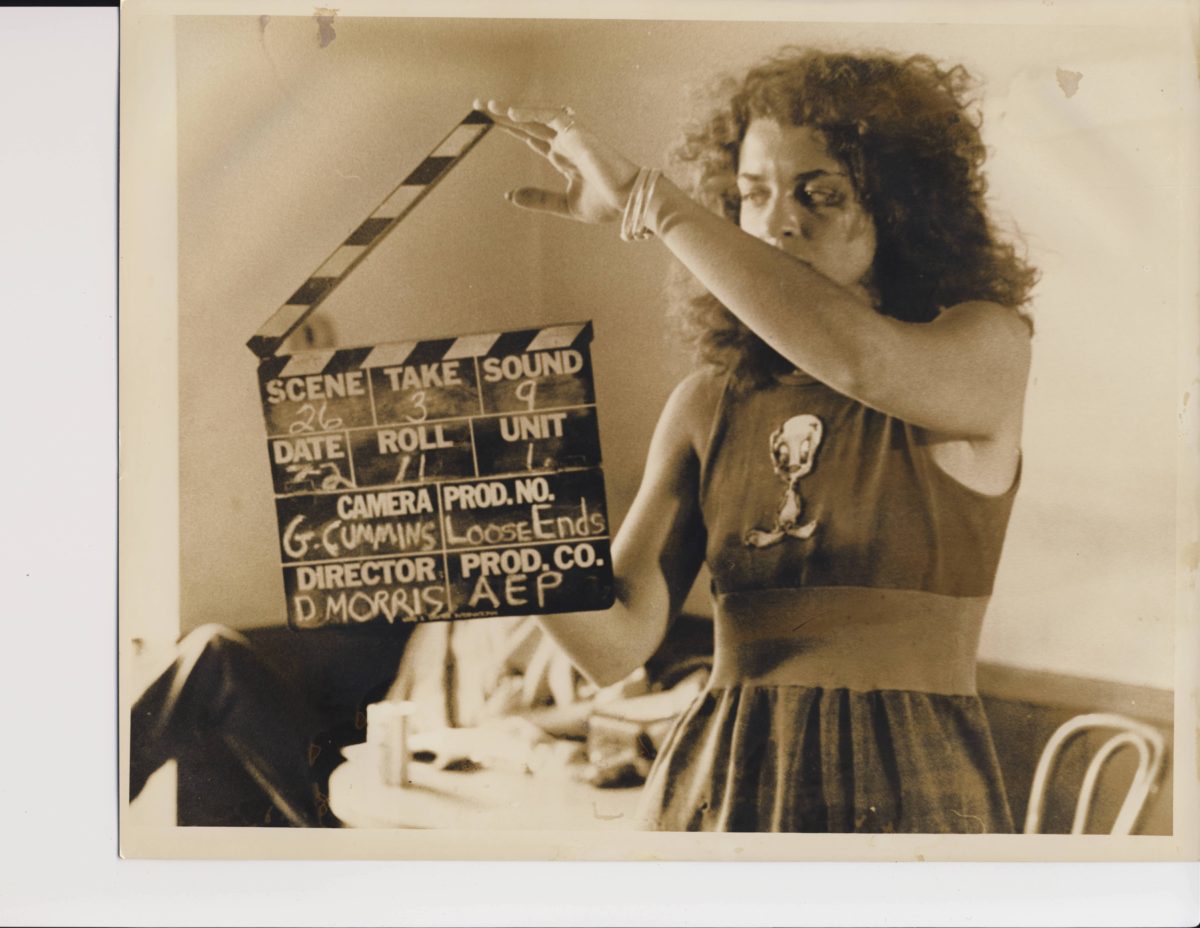
That is First Avenue where you filmed the dancing sequence, right?
Morris: Yes, it is. The guy who owned First Ave at that point, Allan Fingerhut, was one of the executive producers. He put money into it. It was called The Depot then.
The Depot, and Mickey’s Diner, didn’t close either. Those are real people and customers in the movie. And then when Chris gets into the shoving match, The Depot’s bouncer thought it was real and, in the film, you can see he approaches Mulkey right before I cut out. I mean, in all the places, we just shot and nobody closed down. When we shot at the gas station, we had a long lens [outside] and just sent Mulkey in the store.
There is the other gas station scene when they try to cash a check —
Morris: That’s a very funny scene. The actor who plays the cashier, he’s another actor from the Children’s Theatre. I don’t know how we pulled that off. We must’ve controlled that place. I have no memory of how we were able to get an actor behind the counter operating the cash register.
Wozniak: I think just a lot of fast talking.
How did you get the clip from Easy Rider that plays during the drive-in scene?
Morris: It was showing at the St. Clair Theater. We brought a camera in and were shooting it. They caught us and threw us out. So we went to a drive-in where it was playing and shot the scene that was in the movie.
Wozniak: I called the studio to try and get permission to use the clip. I told them who I was and what I needed to talk to them about. They passed me from one person to another to another and, finally, to one of their attorneys. I explained to him exactly who I was and what we had done, how we had gotten the footage from a drive-in movie screen. He took a long, long pause and said, ‘I’ll tell you what, dear, why don’t you hang up the phone and pretend that we never had this conversation. Good luck to you and I hope everything works out great.’ (laughs) He was basically in shock and had no idea what to do with me or what to say to me. He was stumped, so he just said, ‘Good luck, hang up the phone, you never talked to me.’
Did that have any repercussions later in trying to release or screen the film?
Wozniak: No. It all went just fine. No one came after us.
Morris: Those were the days…
Loose Ends includes an extended road trip sequence in the third act that seems to predict Patti Rocks. What drew you to the road film genre as a means of exploring these characters?
Morris: I’ve always been attracted to road films. The film I hope to do in the fall, called Full Cleveland, is about a road trip. I can’t tell you intellectually why I am driven to the road movie, no pun intended, but I’ve always seemed to gravitate to that. I don’t know why… it’s a sense of finding something else, you know? Characters unhappy with their lives and needing to move; Moving geographically to try to change your headspace. Not that I am that way. I don’t do geographic moves, I don’t think.
As a non-professional production, how did you go about shooting the road scenes? That had to have been a challenge considering some of the shots you captured.
Wozniak: (laughs)
Morris: We built this wooden contraption that hung from the door. Greg Cummins (the cinematographer) actually sat or stood or kneeled on it and then we just tied him to the car. Then we had the AD, Jim Morrison, bungy strapped to the hood, so he wouldn’t fly off, with a sun gun pretending to be headlights. And that’s when a cop pulled us over. He asked, ‘What are you doing?’ I said, ‘We’re making a movie.’ And he says, ‘Like this?’ I said, ‘Yeah, that’s how you make movies.’ And he said, ‘Alright, well, just go down to the next exit, that’s not my territory.’ And we just said ‘thanks a lot’ and hit the road.
I wish we had more lights. The driving scenes are really dark. We never saw dailies. We just shot the film, or else I might’ve noticed we needed more lights in the car.
Wozniak: But even if we did, we couldn’t have gone back to reshoot. That just wasn’t part of the program.
Morris: But that’s how we did the driving scenes. Patti Rocks was much more complicated. We towed and it was just a nightmare in the middle of the winter. It was really difficult. We were dressed in snowsuits, crammed into a van. It was really horrible. You couldn’t move.
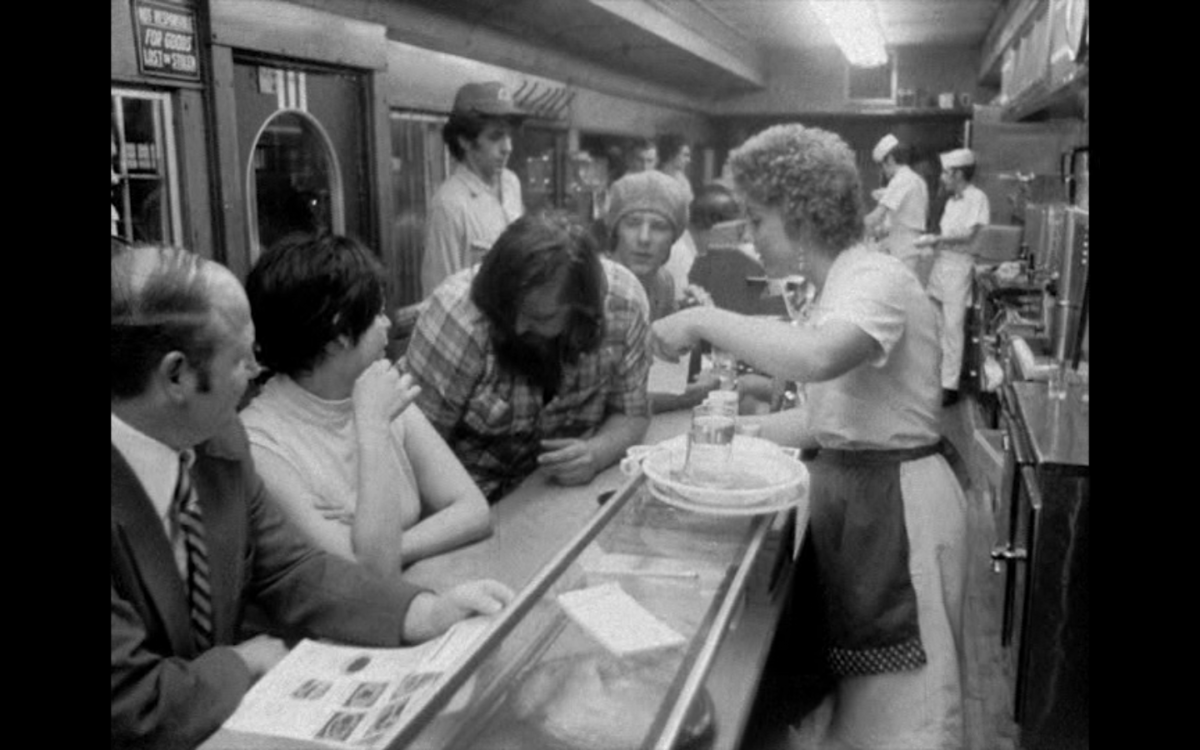
David, you were at UCLA when you made this film over a summer break. How did your professors react to a student making a feature film outside of class?
Morris: They wouldn’t give me my degree because I didn’t have an advisor on the shoot. So I said, ‘Well, fuck you. I’ve already played at a bunch of film festivals, Roger Ebert’s discovered us.’ But it didn’t matter, so I quit school. I didn’t graduate. Then in 2012, I went down to UCLA and asked how many credits I was shy of a degree, and it was just a couple. I was friends with the dean at that point, and she said I could just do it online, so I am Class of 2012. I periodically get these emails asking, ‘How are you doing on the job hunt?’ They don’t realize I am way over age.
Loose Ends was a truly independent film before the term had really become part of the lexicon in America. The film was often referred to as a “regional film.” How did that term sit with you when you read it in reviews?
Morris: I thought it was very pejorative. Like, ‘What’s fucking regional?’ Films are shot in certain states all the time, whether it’s a Hollywood production or independent. I didn’t like that term at all.
Wozniak: They didn’t know how to pigeonhole us. Most people thought movies only came out of Hollywood. So if you weren’t part of that system, they didn’t know what to do with you, or how to refer to you, or who you were. You were just an anomaly.
Morris: But they wouldn’t call Cassavetes’ Faces (1968) ‘regional.’
Wozniak: No, but he was an established actor. Even though he did independent films, he was there in Los Angeles working inside the system. We were not. We were these two young people from the Midwest, and it was like, ‘who the fuck are you and what the fuck is this?’ They didn’t know how to categorize us or our film.
Morris: But I hated it. I never considered myself a regional filmmaker. I just considered myself a filmmaker — I could be a bad filmmaker, but I wasn’t a regional filmmaker.
A Blu-ray release of Loose Ends was unfortunately shelved after the film received a beautiful restoration. Can you tell us what prevented the release?
Morris: I was out in California and a guy called from Vinegar Syndrome who said he’d found the negative in a warehouse in New Jersey. He wanted to know if I was interested in doing a DVD release, and I said, ‘Yeah, that would be great.’ This took some time, a process of a year or two. They fixed the negative, they did interviews — one with me and one with Chris Mulkey — and then a commentary with Victoria and me.
But the release was always being delayed, quarter by quarter. First of all, when they first told me they wanted to do this, I thought, ‘Well, who’s going to want to buy a DVD of Loose Ends?’ It’s so old. And Vinegar Syndrome primarily releases genre films — horror, kung fu, and stuff like that. Eventually it never happened because I don’t think it fit into anything they wanted to do. I think they wanted to do a whole art film side of the business and I don’t know if they ever got the films, or what, so, when it kept getting postponed, I eventually just said, ‘Why don’t you give it back to me?’ and they gave it to me.
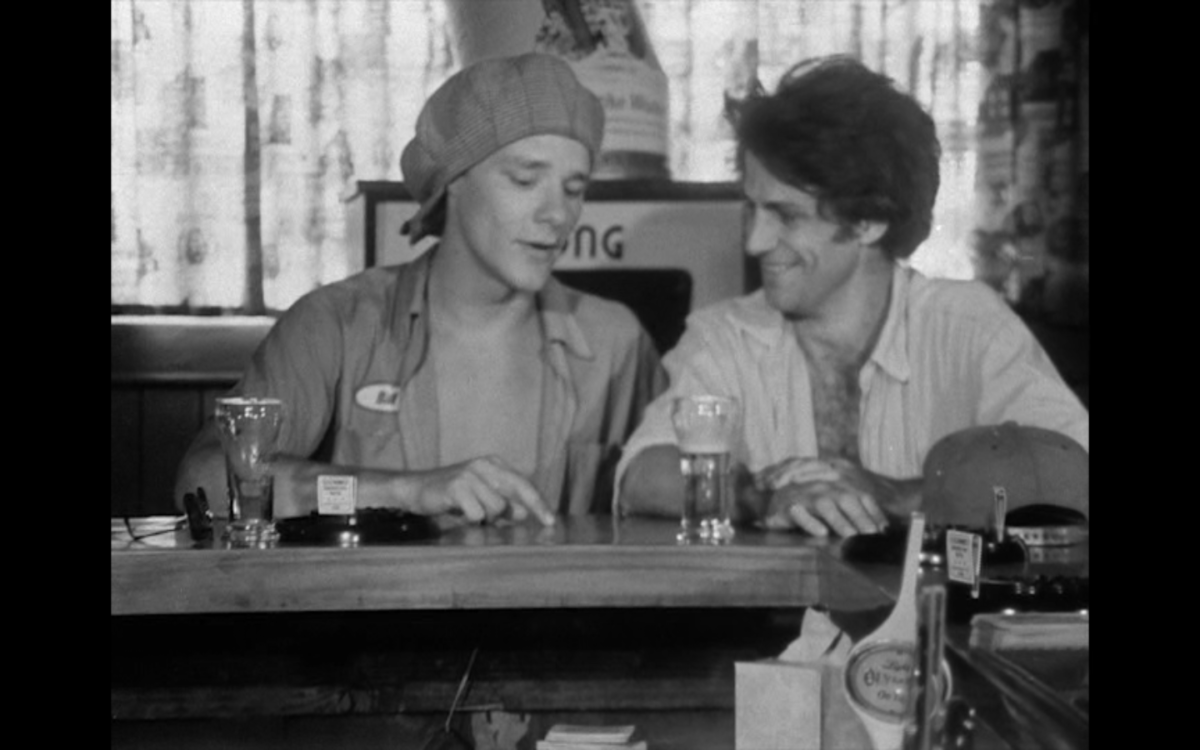
Between Loose Ends and Patti Rocks you made Purple Haze, a drama set within the Twin Cities counterculture scene in 1968. You have distinguished Purple Haze as being a ‘real movie’ as opposed to the skillfully amateur production of Loose Ends. What were some of the most striking differences for you both making the leap into professional filmmaking?
Morris: We had a crew of 30 and a tight schedule. We didn’t have SAG because we couldn’t afford SAG unfortunately, so we didn’t have to deal with their regulations. We didn’t have a lot of money but it was a much bigger deal. And it was very unpleasant to make, quite frankly. We had a producer that we brought in and it turned out to be a nightmare.
Wozniak: That was part of it, but there were parts of it that were great fun. It was just a bigger scope. Loose Ends is very tight and focused. Purple Haze was more complicated. We casted the leads and most of our crew in L.A.
Morris: And New York.
Wozniak: But the rest of the casting was local.
Morris: I didn’t know what we had until we screened it at the Chicago Film Festival, and it was rapturous. The music was really fantastic, but I had no idea that it was gonna be as popular as it turned out to be. When we screened it in Deauville, France, there were kids in the audience taping the film with recorders for the soundtrack. I mean, it was insane!
David, you also directed a horror film called The Meateater that was released in 1979. As you’ve said, your original plan before Loose Ends was to make a horror film, Attack of the Sewer People, to jumpstart your career but you both ultimately decided to make a drama instead. What was your experience like making a horror film at this point in your career and at what point did you have your name removed from it?
Morris: No, I didn’t take my name off. I never used my real name. It was always ‘Derek Savage.’ Were you the person who sent me the Amazon link? It’s on sale on Amazon.
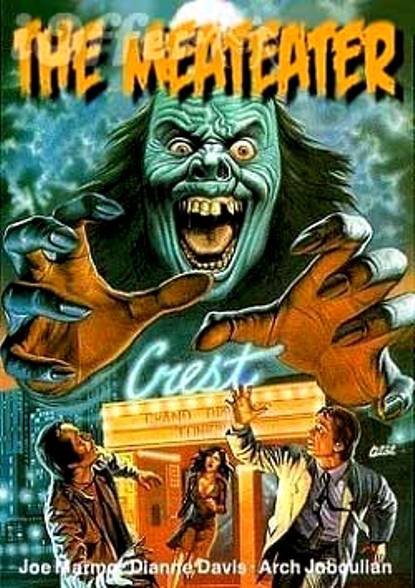
No, that wasn’t me. I found a VHS copy on eBay.
Morris/Wozniak: Oh God! NOOOOOO! (laughs)
Morris: I’ll pay you your money back. I don’t even have a copy of it.
I did it as a lark! We tried to make a really bad sort of film. But the producer was serious! We were just along for a gag. At the time I made it, Victoria and I weren’t living together and I needed to do something. I met this guy who had some money and a theater in a suburb of LA. He said write a movie for this theater, the Crest Theater, so I said, ‘Yeah, I’ll do that.’ I think I wrote it in three days with a half a bottle of whiskey. You know what I mean? I wrote it on paper, laying on my bed. That was that.
I’m surprised there’s fans of it. I periodically get emails about it, and a few years ago it screened in Brooklyn of all places. But it was just a joke. (laughs) Like I said, I never even put my real name on it, it was always Derek Savage and then somehow I got outed by it. Now it’s on my IMDb page.
When IMDb still had comments on films, the comments were more entertaining than the film — Things like ‘I wanted to smash my TV after watching it’ and stuff like that. Periodically, I get asked who owns the rights and I don’t think anybody does because the producer is dead, and so it’s now on sale on Amazon. I’ve seen it on sale in an Italian version with an Italian one-sheet [on the cover] which is really fantastic, which I would love to have a copy of, but I can’t imagine how this thing has any life in it at all.
I didn’t bring in the usual crew, like Mulkey and them, and in retrospect, I don’t know why I didn’t — because they would’ve been too good, quite frankly. I would’ve had real actors. The lead actor, who plays the theater owner, was so nervous his legs were shaking before he delivered his lines. We had to keep him plied with Xanax. And all the Oscar Mayer wiener stuff was just a lark. Some people took it seriously, like the producer, who thought we were making a real horror film. George Caldwell, who, if you remember in the movie, these two cowboys walk [into the theater] holding hands, that’s George and myself. He and I put it together. He was an actor, a very good actor. He did a lot of episodic stuff. We whipped it together. But we were just trying to entertain ourselves with somebody else’s money.
Have many people reached out to you about the film?
Morris: Several times people have wanted to track down the rights and they find me because of IMDb now. They couldn’t find Derek Savage so I tell them that he’s dead; that he died in Florida and they try to track down his death and all this stuff and I’m like, ‘Just put the film out, I don’t care.’
There is not one memorable moment in that film for me, but I had a fun time making it. I really had a fun time making it. And we had a lot of good people who went on to do pretty good things work on that movie — Not the actors, but the crew. Anne Kimmel, who produced some Paul Bartel films, was on that.
Wozniak: Oh, she was? I was not involved in that film very much.
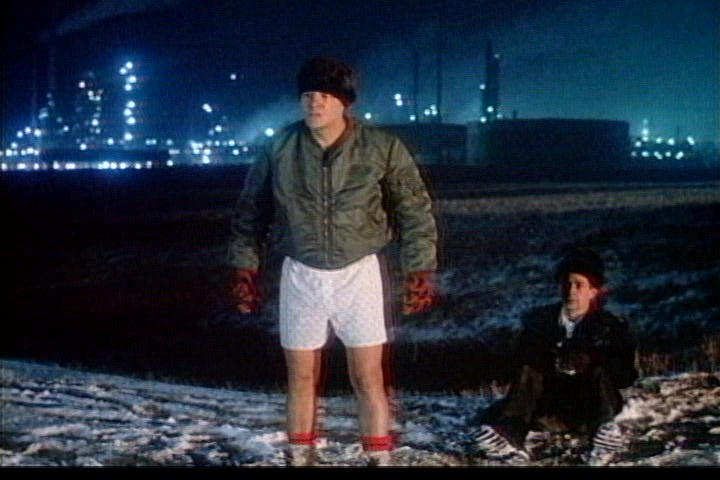
What inspired you to return to the characters of Eddie and Billy so many years later with Patti Rocks?
Morris: I had gotten hired and fired from two studio films — one was a Tom Hanks film — and I was just very depressed.
Wozniak: I had also had a massive car accident.
Morris: She was coming back from an IFP board meeting, and a woman driving her daddy’s Mercedes crossed the center line and hit her head-on.
Wozniak: It completely totaled my car and they had to cut me out of it. My intestines blew apart, my ankle shattered, and I had multiple wounds all over my body. I was in a lot of pain. I had two operations before I was in the hospital for three or four weeks. That contributed to feeling out of place and out of time. We had just had our second child at that point, too, so things were a little upended in our lives.
Morris: Around that time I started thinking that the only time I really enjoyed making a movie was Loose Ends because it was just three or four of us. No one was telling us what to do. We were just doing it. I said, ‘Why don’t we make a sequel set 12 years later?’ and that’s how Patti Rocks started. It resurrected my enthusiasm for filmmaking and it resurrected my career after getting fired from the studio films. It revived me for a good decade at least.
Victoria, you are credited with creating the characters on Patti Rocks, but not with any of the writing. Did you have any involvement with the production?
Wozniak: I wasn’t terribly involved in it. I was still recovering from the accident and we had a very small child at the house. I was involved peripherally, but not in the writing. David, Chris, Karen [Landry], and John did a lot of improv. Out of that improv, some of it was born, and David put it all together.
The screenplay for Patti Rocks is credited to David and the three principal actors.
Morris: I taped all the improvs and then I transcribed them. That took awhile. And [the actors] weren’t involved in this at all, even though they share a screenwriting credit, which I never agreed with. I worked like Mike Liegh; improv with the actors and then you put it all together. But we had hours and hours of improv so then I put it into a three-act structure. It was really two acts: Billy and Eddie on the road and then at Patti’s. I never thought anybody would make the film, but the first guy we sent it to was Sam Grogg at FilmDallas, and he agreed to make it. But he said, “They have to get out of the car at some point.” So that’s where I came up with that scene where they’re on the side of the road and the woman drives by with her daughter and wants to see Billy’s “garden hose for a dick.” That’s how I got them out of the car.
It was originally written for the summer. But we got the money in October and I said, ‘We’re not waiting, we’re just going to shoot in December.’ I think it’s a lot funnier with Mulkey in his underwear running around in the snow. It was 28 below when we shot that stuff. It was the dead of winter in Minnesota and it was really cold. I got pneumonia like the second day.
Related: Read our 2019 review of Patti Rocks
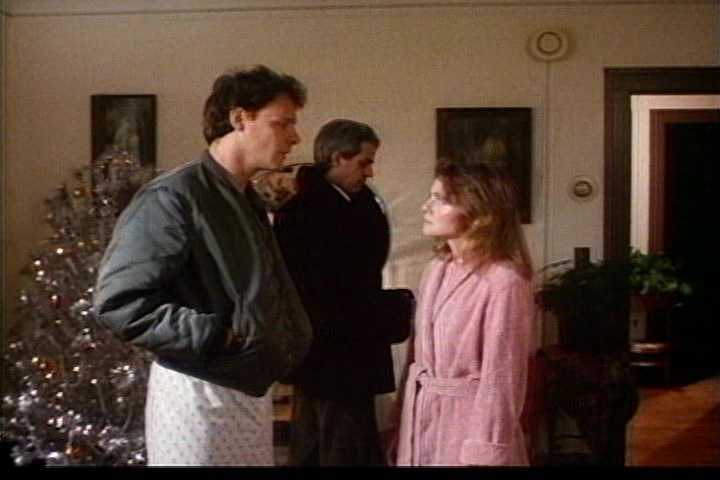
At what stage did the structure of Patti Rocks take shape where it would shift out of the male-centered road trip and into the more challenging, and emotionally complex, dynamic established in Patti’s apartment?
Wozniak: I will take the credit for suggesting that Patti, when they got to her apartment, didn’t give a shit about getting married. (laughs) [Originally,] when Billy got to Patti, she was going to be upset, because she was pregnant and really loved him and wanted to marry him. I basically said, ‘These guys are assholes. If you make people sit through this and then have her be unhappy about not being coupled with this guy, this is not a good thing.’ There’s a point where you’re with male characters and you’re in their heads, but the women in their lives have to have something to say as well. They have to have their own presence and their own strengths and they have to speak. So that’s when it turned into what it became, with Patti being strong.
Morris: And I have to credit Karen Landry with shaping Patti Rocks, the character. She was very good at channeling what Victoria is describing. I love that scene at the end at the kitchen table where she’s talking about giving [the men] scores for diving, but for fucking. Then she asks to see a photo of Billy’s kids, and Billy first says he doesn’t have any. Eddie says, ‘Yeah, you do, show her,’ and Chris starts crying. Those are Chris’ and Karen’s real kids [in the photo]. That wasn’t scripted and it made the scene because I didn’t expect it and just kept the camera going. It redeems Billy slightly, for a little while… It was one of those magic moments; an unplanned thing that happened because those were his real kids and because Karen was his real wife. It just happened. Just one take. You couldn’t recreate that because it would be false. But Karen had a lot to do with shaping that character.
Patti Rocks is notorious for its language. What were early screenings like? How did audiences respond to the film?
Morris: I didn’t go to a lot of them in L.A. before it was released. [Producer] Gwen Field went to all of them. People would come up to me in restaurants and stuff to say they saw it at a screening and thought it was fantastic. Word on the street was very good. And when we opened in New York, at the Waverly, we broke house records for the first two weeks. But FilmDallas had no clout, and the people running the Waverly closed it down for renovations without telling them, and we had to scramble around Manhattan to find other theaters and all the sort of momentum that was building collapsed. Which was too bad. It was really doing well and the reviews in New York were fantastic. ‘Work of genius’ and that kind of stuff. And Chris was on Letterman and it was really building. But the problem was FilmDallas should never have gone into distribution. They should have just stayed a production company like they did earlier with films like The Trip to Bountiful (1985). They lost their shirts. Repercussions of that hurt the film.
Patti Rocks really accentuates the crudeness and vulgarity of the Loose Ends characters. If you see these types of characters nowadays, they are usually condemned from the start and portrayed flatly as “toxic” or “problematic” villains. What drew you to explore these characters in a way that is still critical, but empathetic rather than judgmental?
Morris: Because I’m a guy for one thing, and I’ve been around those raunchy discussions all my life — not anymore though. And I liked the fly-on-the-wall thing with those two guys, drunk and talking about women, in that tin-can car. I thought a lot of it was just so outrageous that people might be entertained by it before they are turned off. That’s why I always said, like you commented on in your article, ‘Don’t walk out in the first hour, because it’s gonna change in the last 30 minutes.’ But I also used Eddie as a foil, who doesn’t really contribute to the vulgarity of Billy and is more like, not a moral compass, but a steady compass. He calls Billy on some of it. John’s character balances it out. He has that one monologue where he talks about when he first met his wife and going to the movies. It’s a really somber scene and I thought it really balanced it all out. Billy is always outrageous — not to the vulgar extent in Loose Ends, but he had that side of him, and Mulkey had that side of him, which didn’t come out in Loose Ends but I certainly saw that in Patti and pushed it. But if I would’ve had two guys acting like that, trying to one-up each other in the car, that would’ve been too much. Eddie was the balance there.
Loose Ends and Patti Rocks were intended to be a part of a trilogy. The third film, Real Hectic, never materialized. What was the story behind that film and can you tell us a bit about where you planned to pick up with Billy and Eddie?
Morris: It really hadn’t been worked out much, but we were probably going to shoot it in North Carolina, where Sam Grogg was the head of the film school. It was going to be — this was in the mid-90s, so how many years would that’ve been? 20 years later? — and it was going to be Eddie’s son Bobby’s wedding. Billy gets invited and hijinks ensue. It was going to be a one-location film, with the wedding, the planning of the wedding, that sort of thing. That’s all I can tell you. Mulkey and I had a falling out and we haven’t spoken since so it never happened.
You have both worked on a number of studio and television projects, between Loose Ends and Patti Rocks as well as after. How have your experiences within the film and television industry been different than on the films you have had more creative control over?
Wozniak: I can speak as a writer, which is where I made my living, basically. The most frustrating part about being a writer is that very few movies get made. You can make a living, which is great, but you have all these wild plans, and you hope someone’s going to make your films, but they don’t, you know? And the industry has changed quite a bit, to a point where I think it’s actually quite abusive to writers, where you have to write on spec and see if somebody wants to pick it up. So, it’s just a different thing when you are writing a movie that you know you are going to go out and make yourself; just find the money, do it, and it’s all yours. Hopefully you’ll find distribution and that’s when you have to let it go to some degree and trust they’ll shepherd it the way it should be.
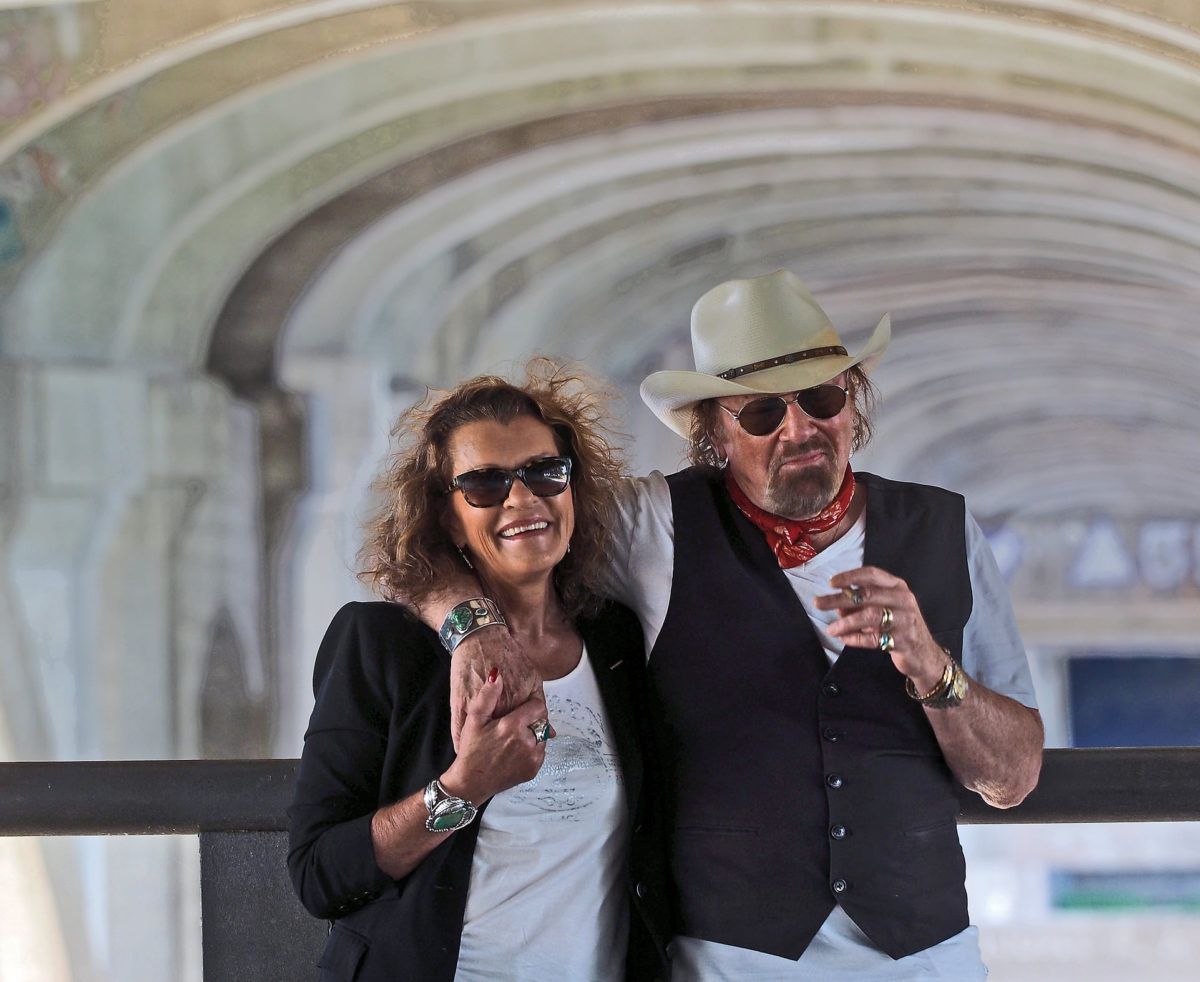
Morris: It’s entirely different if you don’t have control. And TV films are just a different animal. Those were just jobs. There’s always something, like a challenge I try to find for myself when making these movies. I did a miniseries on Jackie Kennedy (Jackie Bouvier Kennedy Onassis, 2000). My goal for that was to try to blend archival footage with the stuff I shot and I think I successfully pulled that off, because the editors won the Golden Reel for that film.
But quite frankly, the thing that keeps me going so many years later is that I haven’t made my best film yet. Hopefully that will be Full Cleveland. I have yet to make a film I am totally 100 percent proud of and the television stuff was just jobs. You do the best you can, but it is what it is. And they sometimes give you really corny titles. My first TV film was really fantastic. I did it for Fox and they wanted an independent filmmaker. It was about runaway boys in L.A., who became male prostitutes on Santa Monica Boulevard. That was probably one of the highlights of my TV career. I think we called it Street Kids, but they titled it The Price of Love (1995). I wouldn’t want to see a movie called The Price of Love! But you have no power, really. You don’t have final cut. So I don’t take ownership. They were just jobs. Parts of them are good. After The Price of Love I did a remake of Pretty Poison (1996), the Anthony Perkins film, for Fox. It’s my bastard child. I really loved the film and they hated it. Then I made one that won the GLAAD award with Bonnie Bedelia (Any Mother’s Son, 1997).
The other thing that changed my career was my movie Jersey Girl (1992). That was going to come out theatrically. And like three days before it was supposed to come out, Peter Guber decided the story was so good, he wanted to remake it with Sean Penn and Madonna or somebody. So they sold it to Fox TV and it really boned my career. I don’t want to say it would’ve been a ‘hit,’ but it would’ve done OK. There’s a lot I don’t like about it, but the film works and it was compared to Working Girl (1988), usually favorably. Jami Gertz is really good in the film and it kinda screwed her theatrical career, too.
So, I’ve had some bad luck with some of this stuff — with FilmDallas going broke when Patti Rocks was coming out, and Jersey Girl not going out as a theatrical release, but it is what it is.
Wozniak: It’s a business.
Morris: As we sometimes remind ourselves, you usually get 10 or 20 good years in this business. And I think we’ve had a little more than that. And here we are talking about a movie we made in 1974. There were so many people I was at UCLA with who I don’t know if they are still in the business or ever even got into the business. We’ve survived — however we’ve done it.
Wozniak: And the truth is, David and I have made a living. We are both artists, and this country is not very supportive of that. We’re lucky. We’ve had the life that we set out to have. Could it have been more successful? Sure. But we got to make a living from our art. Most people can’t.
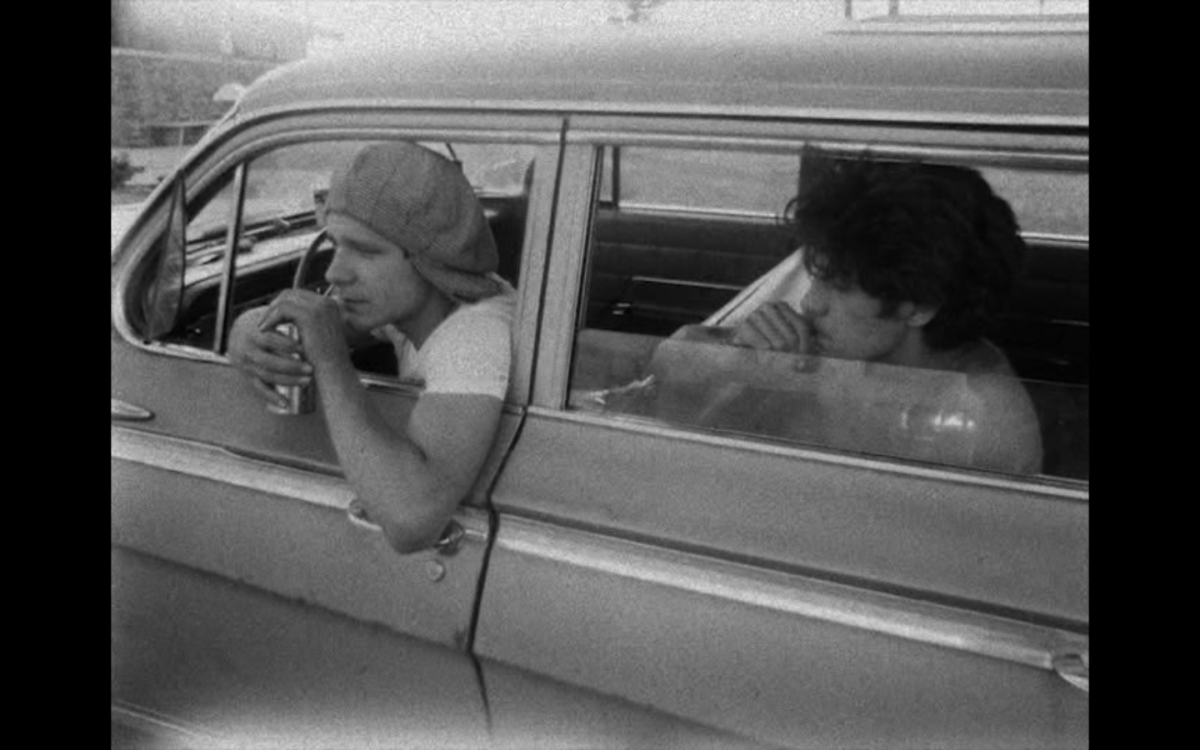
If you are interested in purchasing Loose Ends or Patti Rocks on DVD, contact David Burton Morris at [email protected]
Stay up to date with all things Split Tooth Media and follow Brett on Twitter and Letterboxd
(Split Tooth may earn a commission from purchases made through affiliate links on our site.)
